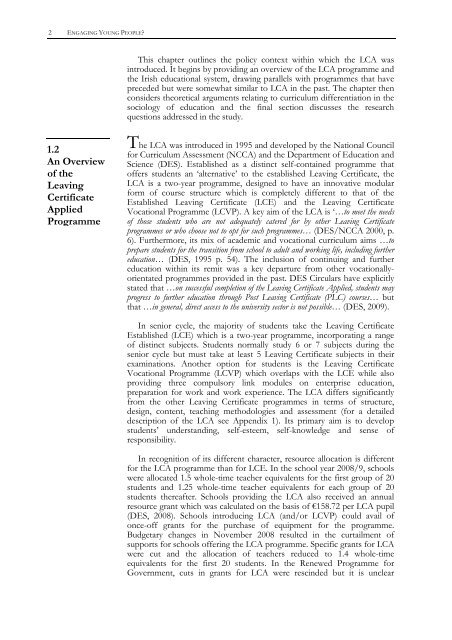Student Experiences of the Leaving Certificate Applied Programme
Student Experiences of the Leaving Certificate Applied Programme
Student Experiences of the Leaving Certificate Applied Programme
You also want an ePaper? Increase the reach of your titles
YUMPU automatically turns print PDFs into web optimized ePapers that Google loves.
2 ENGAGING YOUNG PEOPLE?This chapter outlines <strong>the</strong> policy context within which <strong>the</strong> LCA wasintroduced. It begins by providing an overview <strong>of</strong> <strong>the</strong> LCA programme and<strong>the</strong> Irish educational system, drawing parallels with programmes that havepreceded but were somewhat similar to LCA in <strong>the</strong> past. The chapter <strong>the</strong>nconsiders <strong>the</strong>oretical arguments relating to curriculum differentiation in <strong>the</strong>sociology <strong>of</strong> education and <strong>the</strong> final section discusses <strong>the</strong> researchquestions addressed in <strong>the</strong> study.1.2An Overview<strong>of</strong> <strong>the</strong><strong>Leaving</strong><strong>Certificate</strong><strong>Applied</strong><strong>Programme</strong>The LCA was introduced in 1995 and developed by <strong>the</strong> National Councilfor Curriculum Assessment (NCCA) and <strong>the</strong> Department <strong>of</strong> Education andScience (DES). Established as a distinct self-contained programme that<strong>of</strong>fers students an ‘alternative’ to <strong>the</strong> established <strong>Leaving</strong> <strong>Certificate</strong>, <strong>the</strong>LCA is a two-year programme, designed to have an innovative modularform <strong>of</strong> course structure which is completely different to that <strong>of</strong> <strong>the</strong>Established <strong>Leaving</strong> <strong>Certificate</strong> (LCE) and <strong>the</strong> <strong>Leaving</strong> <strong>Certificate</strong>Vocational <strong>Programme</strong> (LCVP). A key aim <strong>of</strong> <strong>the</strong> LCA is ‘…to meet <strong>the</strong> needs<strong>of</strong> those students who are not adequately catered for by o<strong>the</strong>r <strong>Leaving</strong> <strong>Certificate</strong>programmes or who choose not to opt for such programmes… (DES/NCCA 2000, p.6). Fur<strong>the</strong>rmore, its mix <strong>of</strong> academic and vocational curriculum aims …toprepare students for <strong>the</strong> transition from school to adult and working life, including fur<strong>the</strong>reducation… (DES, 1995 p. 54). The inclusion <strong>of</strong> continuing and fur<strong>the</strong>reducation within its remit was a key departure from o<strong>the</strong>r vocationallyorientatedprogrammes provided in <strong>the</strong> past. DES Circulars have explicitlystated that …on successful completion <strong>of</strong> <strong>the</strong> <strong>Leaving</strong> <strong>Certificate</strong> <strong>Applied</strong>, students mayprogress to fur<strong>the</strong>r education through Post <strong>Leaving</strong> <strong>Certificate</strong> (PLC) courses… butthat …in general, direct access to <strong>the</strong> university sector is not possible… (DES, 2009).In senior cycle, <strong>the</strong> majority <strong>of</strong> students take <strong>the</strong> <strong>Leaving</strong> <strong>Certificate</strong>Established (LCE) which is a two-year programme, incorporating a range<strong>of</strong> distinct subjects. <strong>Student</strong>s normally study 6 or 7 subjects during <strong>the</strong>senior cycle but must take at least 5 <strong>Leaving</strong> <strong>Certificate</strong> subjects in <strong>the</strong>irexaminations. Ano<strong>the</strong>r option for students is <strong>the</strong> <strong>Leaving</strong> <strong>Certificate</strong>Vocational <strong>Programme</strong> (LCVP) which overlaps with <strong>the</strong> LCE while alsoproviding three compulsory link modules on enterprise education,preparation for work and work experience. The LCA differs significantlyfrom <strong>the</strong> o<strong>the</strong>r <strong>Leaving</strong> <strong>Certificate</strong> programmes in terms <strong>of</strong> structure,design, content, teaching methodologies and assessment (for a detaileddescription <strong>of</strong> <strong>the</strong> LCA see Appendix 1). Its primary aim is to developstudents’ understanding, self-esteem, self-knowledge and sense <strong>of</strong>responsibility.In recognition <strong>of</strong> its different character, resource allocation is differentfor <strong>the</strong> LCA programme than for LCE. In <strong>the</strong> school year 2008/9, schoolswere allocated 1.5 whole-time teacher equivalents for <strong>the</strong> first group <strong>of</strong> 20students and 1.25 whole-time teacher equivalents for each group <strong>of</strong> 20students <strong>the</strong>reafter. Schools providing <strong>the</strong> LCA also received an annualresource grant which was calculated on <strong>the</strong> basis <strong>of</strong> €158.72 per LCA pupil(DES, 2008). Schools introducing LCA (and/or LCVP) could avail <strong>of</strong>once-<strong>of</strong>f grants for <strong>the</strong> purchase <strong>of</strong> equipment for <strong>the</strong> programme.Budgetary changes in November 2008 resulted in <strong>the</strong> curtailment <strong>of</strong>supports for schools <strong>of</strong>fering <strong>the</strong> LCA programme. Specific grants for LCAwere cut and <strong>the</strong> allocation <strong>of</strong> teachers reduced to 1.4 whole-timeequivalents for <strong>the</strong> first 20 students. In <strong>the</strong> Renewed <strong>Programme</strong> forGovernment, cuts in grants for LCA were rescinded but it is unclear

















